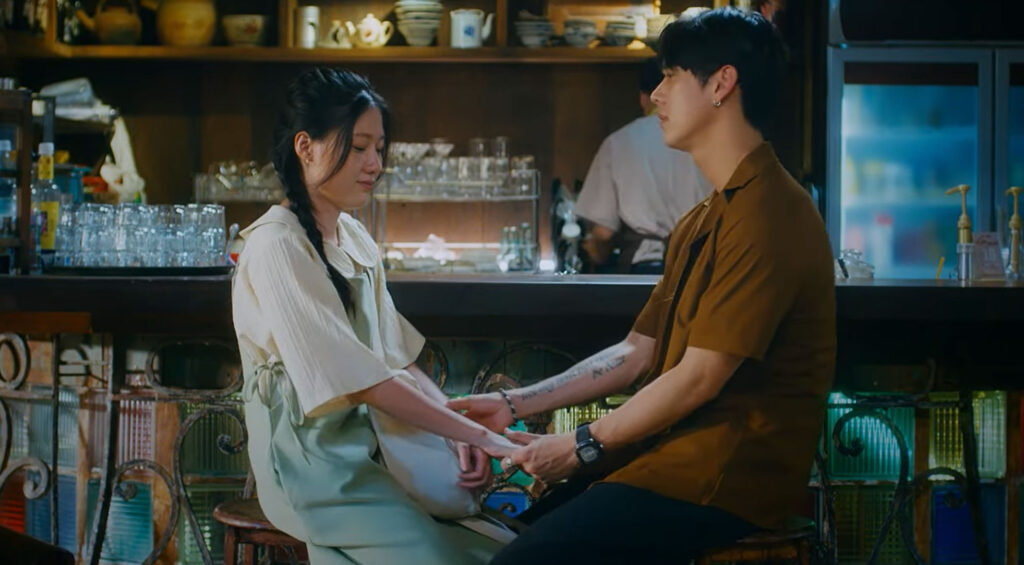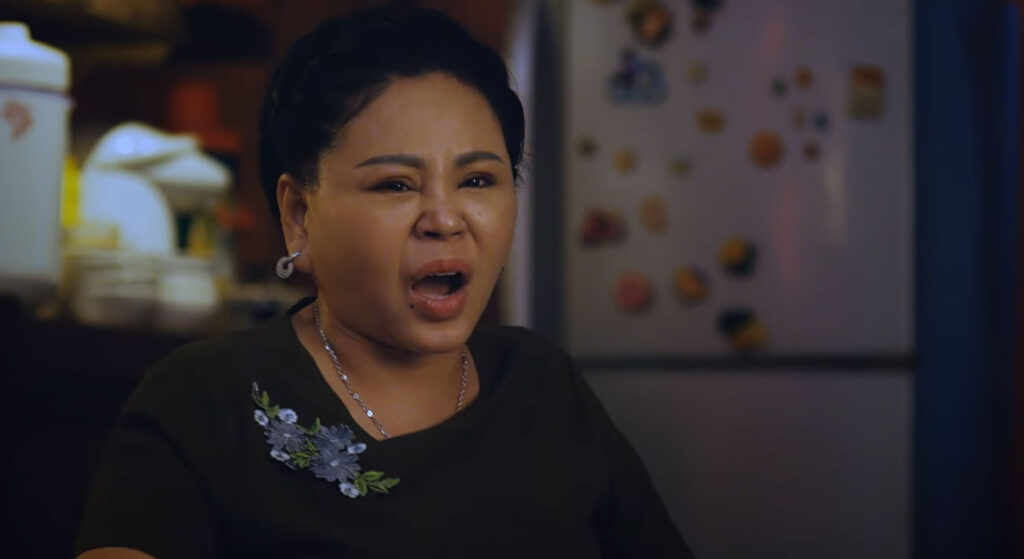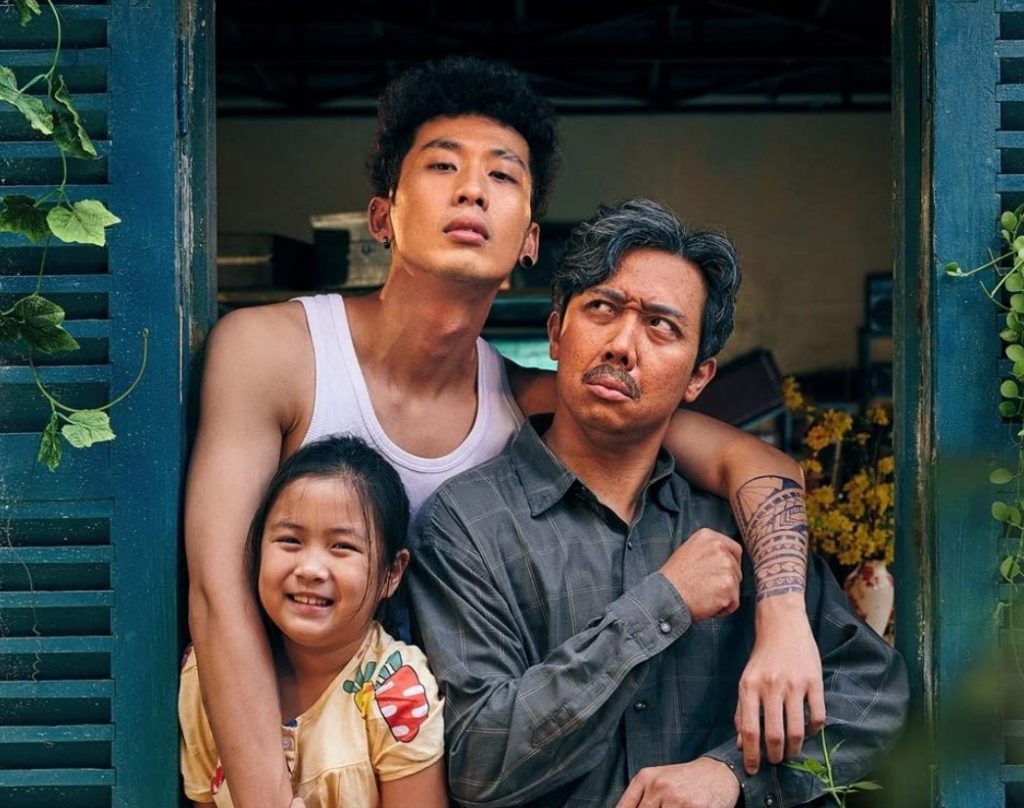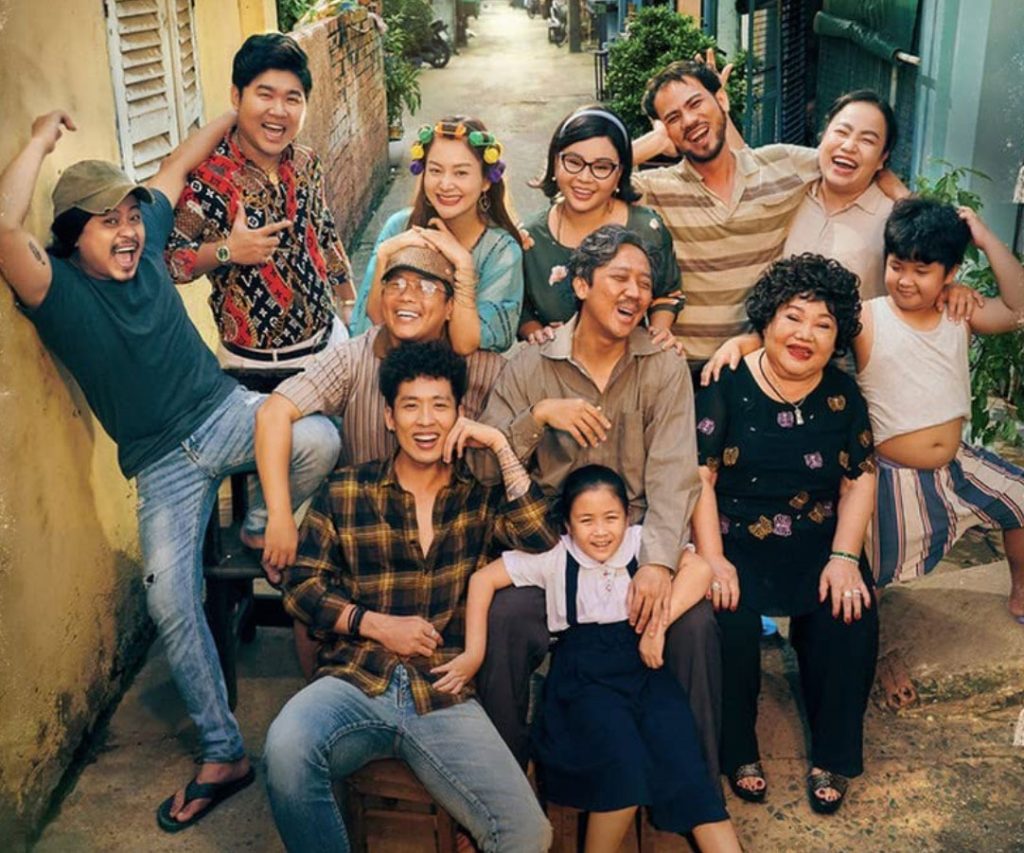March 10, 2023
by Carla Hay

Directed by Tran Thanh
Vietnamese with subtitles
Culture Representation: Taking place in the Thu Duc area of Ho Chi Minh City, Vietnam, the dramatic film “The House of No Man” (also titled “Ms. Nu’s House”) features an all-Vietnamese cast of characters representing the working-class, middle-class and wealthy.
Culture Clash: A domineering matriarch/restaurateur (who lives with her mother, her two adult daughters, and her son-in-law) has various clashes with people in her family, especially her younger daughter who has very different plans on how she wants to live her life.
Culture Audience: “The House of No Man” will appeal primarily to people who are interested in seeing a melodramatic but well-acted movie about how family issues and society’s gender roles can affect relationships.

There have been plenty of movies made about overbearing matriarchs, but “The House of No Man” is one of the more memorable of these types of films in the early 2020s. Some of the characters’ shrillness can get irritating and repetitive. However, this drama about a female-dominated family gets better in the last half of the movie. Huỳnh Uyển Ân gives a standout performance as someone who learns lessons about life.
Directed by Tran Thanh and written by Tran Hoang Ngoc Huyen, “The House of No Man” (also titled “Ms. Nu’s House”) is a much better film than Tran Thanh’s 2021 movie “Bố Già (Dad, I’m Sorry),” which he co-directed and co-wrote. “Bố Già (Dad, I’m Sorry)” is another drama about a bickering family with an aspiring YouTube star. Whereas “Bố Già (Dad, I’m Sorry)” was mainly about father-son issues, “The House of No Man” is mainly about mother-daughter issues. Realistic scenarios and convincing performances make “The House of No Man” an interesting character study about control and growing pains within a dysfunctional family.
In “The House of No Man” (which takes place and was filmed in the Thu Duc area of Ho Chi Minh City, Vietnam), the household of the movie’s title is ruled over by Ngoc Nu (played by Lê Giang), a middle-aged divorcée, who is still bitter that her ex-husband left her and their two daughters several years earlier, when the children were underage. Her ex-husband has not been in the family’s life since he left them. Because of this bitterness, Nu has deep mistrust and hatred of most men. It’s mentioned later in the movie that she hasn’t been in a serious romance since her divorce.
Nu owns and operates a small, casual restaurant called Bā Nū’s (which means “Ms. Nu’s” in Vietnamese) that’s part of the apartment complex where she lives with several other family members. The restaurant’s specialty is crab soup cakes, which Nu prides in making herself. The movie opens with a close-up scene of Nu shucking crabs.
Working at the restaurant is one of the few things that seems to bring Nu a little happiness. She’s a tough taskmaster at work and at home. Her biggest personality flaw is that she has a nasty temper and will fly into a rage and get violent. There are several scenes of her slapping, punching, kicking, and inflicting other physical abuse on people inside and outside her household. She also frequently yells at people and is verbally abusive if she doesn’t get her way.
In other words, Nu is a nightmare to be around, more often than not. The family members who live with her in the same apartment unit are fearful of Nu. They can’t just leave, because she is the main source of income in the household, and they depend on her financially. Nu uses this power to her advantage to control people in the household and tell them how they should live their lives.
Nu’s elderly mother Ngoc Ivory (played by Ngoc Rich) is kind and compassionate—in other words, the opposite of Nu. Ivory is the only person in the household who isn’t a target of Nu’s raging tantrums and physical abuse. Ivory is usually the peacemaker in the household when Nu gets in a conflict with another member of the family.
Nu’s older daughter, Ngoc Nhu (played by Kha Nhu), who’s in her late 20s, is an aspiring YouTube star who does “influencer” videos about domestic activities, such as cooking, applying makeup and interior decorating. Nhu, who has a tendency to be vain and superficial, helps at the restaurant by being a server. Nu doesn’t approve of Nhu’s social media activities and thinks it’s all a waste of time.
Nhu is married to Phu Nhuan (played by “The House of No Man” director Tran Thanh), who is the only male in the household. To say that Nhuan is a “henpecked husband” is an understatement. Not only does Nhu constantly yell at Nhuan because she doesn’t like it when he wants to hang out in bars with his buddies, but Nu also berates Nhuan frequently because she thinks Nhu made a bad choice in marrying Nhuan.
Nu thinks Nhuan is a loser because he doesn’t seem interested in having a career or a job that pays enough to support him and Nhu. Nhuan works as a delivery person for Nu’s restaurant, but he’s not very good at the job. He’s prone to make mistakes or make late deliveries. Nhuan is unhappy in his marriage because he can’t seem to do anything right to please his wife and mother-in-law.
Nu’s younger daughter, Ngoc Nhi (played by Huỳnh Uyển Ân), is in her late teens. Nhi is very sensitive, creative and intelligent. Nhi dreams of being a maker of pottery and other handmade crafts. Nu thinks it’s a foolish goal, so she pressured Nhi to take banking classes instead. (The banking classes part of Nhi’s life is not shown in the movie but is talked about in the film.) Nu thinks Nhu is a lost cause, but Nu has high hopes that Nhi will be a success. And that’s why Nu is extra-controlling and critical of Nhi, who inevitably starts to rebel.
How controlling is Nu? When Nhi goes to a nightclub where her best friend Lan (played by Phuong Lan) is having a birthday party, Nu won’t give Nhi permission to go. Nhi goes to the party anyway. And when Nhi gets home, she is scolded by Nu: “No more friends named Lan! No more friends whose name that starts with ‘L’!”
Lan is very bossy with her on-again, off-again boyfriend of six years, whose name is Bộ Của Lan (played by Phan Đạt), but she is a loyal and understanding friend to Nhi. Lan encourages Nhi to follow her dreams and not let Nu bully her. Lan’s group of close friends also includes a platonic male pal named Quynh Ly (played by Li Hao Meng Quynh), who is mild-mannered and a little shy. Ly has a crush on Nhi, and he is usually at social gatherings with Lan, her boyfriend and Nhi.
It’s at this birthday party that Nhi meets one of Lan’s friends who will change the course of Nhi’s life. His name is John (played by Song Luân), whose full Vietnamese name is Banh Kem. John, who is about the same age as Nhi, is a rich guy who has recently moved back to Vietnam after living in the United States to attend an unnamed school. It’s infatuation at first sight for John and Nhi, who have immediate romantic sparks with each other from their first conversation.
Nhi and John begin dating each other, to the disapproval of their families. Nhi knows that her controlling mother doesn’t want her dating anyone, so Nhi keeps her relationship with John a secret from her mother for as long as possible. But man-hating Nu eventually finds out and gets angry about this young romance, because she says that John will just use Nhi for sex.
John’s father Dai Phat (played by Cong Ninh) owns several factories (what is made in those factories is never mentioned in the movie), and he wants John to eventually take over the business. John’s mother (played by Ngan Quynh), who doesn’t have a name in the movie, agrees with whatever her husband says. John’s parents are snobs, so it should come as no surprise that they don’t approve of John dating Nhi, because they think Nhi comes from a gold-digging, trashy family.
John and Nhi continue to date each other, despite the objections and disapproval from their parents. John doesn’t want to go into his family’s business. He wants to open a cafe with Nhi, and they plan to sell Nhi’s pottery and other craftwork in the cafe. Certain things happen that dramatically alter John and Nhi’s relationship in the last half of the movie, which is the best part of the “The House of No Man.”
Two characters in the movie don’t get a lot of screen time, but they play significant roles in how the story develops. Nu’s middle-aged landlord Liem Van (played by Việt Anh) is an easygoing and calm person who witnesses a lot of the turmoil in Nu’s family. Someone else who knows what’s going on with the family is a YouTuber/social media influencer in his 20s named Le Minh Tiger (played by Le Duong Bao Lam), who likes to do a lot of livestreams at the restaurant. Tiger, who is a nosy gossip, tells a curious John about Nu’s divorce, in order to explain why Nu is the way that she is.
“The House of No Man” is at its best when it’s about the relationship between Nhi and John. For all of Nu’s domineering ways, Nu is often a one-note character, who only shows another side of herself much later in the movie. Nhi is by far the most interesting character in the movie, made all the better because of Huỳnh’s terrific performance. Viewers get to see Nhi mature during the story, which takes place during the course of about two years.
“The House of No Man” is a story about mothers and daughters, but it’s also a story about the highs and lows of a first serious romance. There are also issues of social class and family legacies that are told effectively in this movie. Some of the plot developments in “The House of No Man” are very melodramatic, but there’s nothing unrealistic about this movie.
The movie’s depiction of violent abuse coming from a woman puts a spotlight on the harsh reality that there is often a double standard when it comes to this type of abuse. Nu does a lot of violent harm to people (male and female) that she probably would have been arrested for if she were a man. The movie doesn’t try to pass judgment on Nu’s violent abuse, but the movie seems to be saying that how you react to this violence says a lot about what you think about gender roles in society.
“The House of No Man” shows issues concerning generational trauma and how children who think they won’t be affected by it are actually affected by it so much, it becomes part of their personality. Nhu has a love/hate relationship with her mother, but Nhu doesn’t really see how much she is turning into her mother, in the way that Nhu disrespects and abuses her long-suffering husband Nhuan. “The House of No Man” is not an indictment or condemnation of households led by women. Rather, this drama demonstrates in poignant ways how any angry and abusive household can take a damaging toll on the people who live there, and what it might take to heal some of those emotional wounds.
815 Pictures released “The House of No Man” in select U.S. cinemas on March 3, 2023. The movie was released in Vietnam on January 22, 2023.


